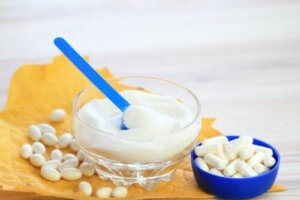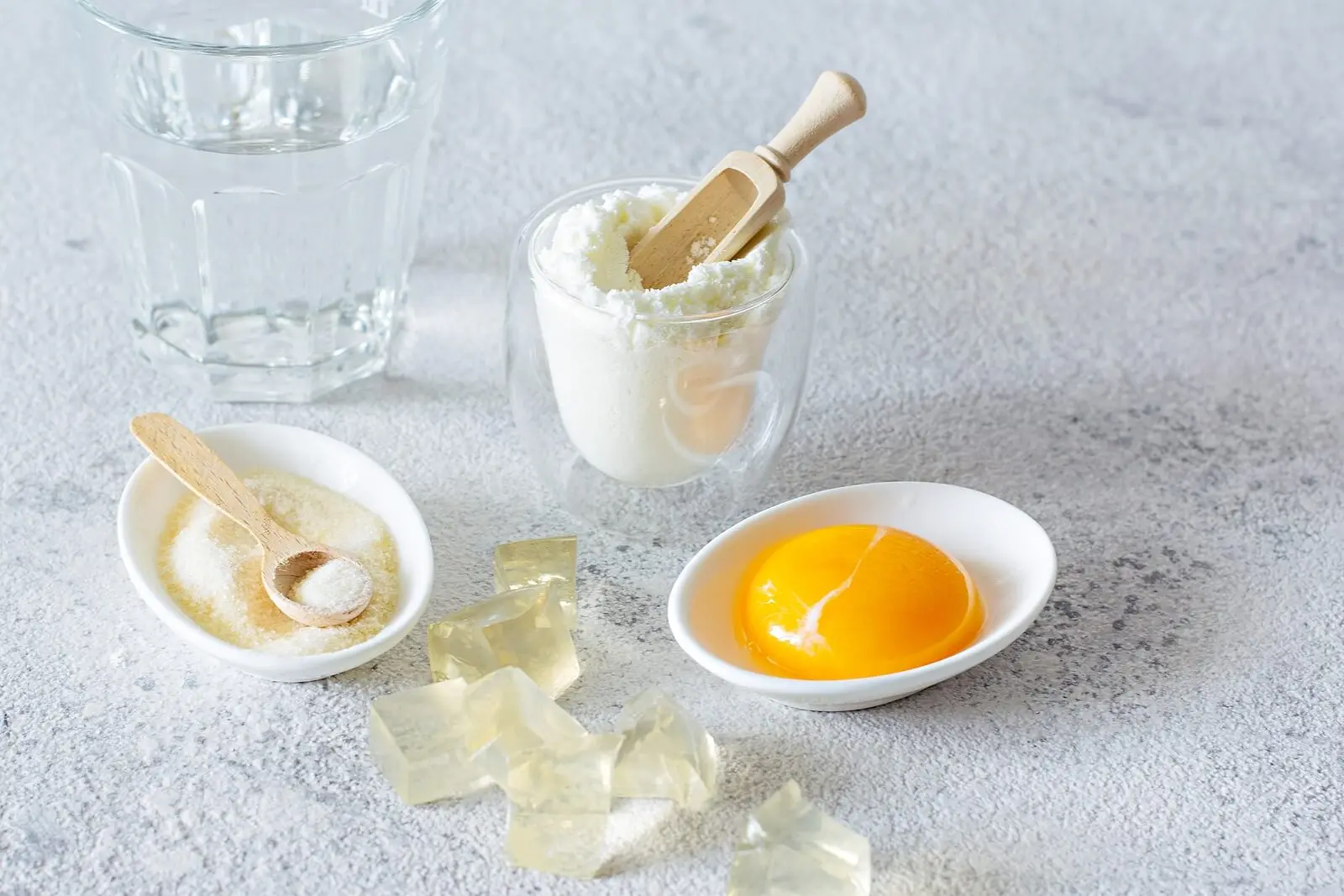Does Collagen Help to Gain Muscle Mass?


Written and verified by the nutritionist Maria Patricia Pinero Corredor
Collagen is a protein present in different parts of the body. Its main function is to hold together different structures, such as skin, tendons, bones, cartilage, blood tissue, adipose tissue, organs and muscles. But do collagen supplements help to gain muscle mass?
This question is often asked by those involved in the world of sports. Although the human body produces this protein naturally, it’s also possible to obtain it through specific foods and products.
However, it’s important to bear in mind that it forms fibers that the body creates structures with in our bodies. It’s responsible for giving firmness and elasticity. That said, let’s see whether or not it’s involved in the formation of lean mass. Read on!
What is collagen?
Collagen is known as the “most abundant protein in the body”. It occurs naturally and is part of various structures. In the case of muscles, you can find it in about 10% of them – in particular in type 3 collagen, which acts as a support in organs with the capacity to expand and contract.
There’s another type of collagen, which is present in almost all parts of the body, but which has other functions such as resistance and elasticity. When taken as a supplement, it’s of the hydrolyzed type, i.e., broken down by the pharmaceutical industry to make it smaller and better digested.
Although the body is capable of synthesizing this substance itself, more and more people are choosing to opt for supplementation. Hence the question “does collagen help to gain muscle mass?” Below, we’ll try to give an answer according to some research findings.

Does collagen help gain muscle mass?
A study reported in the journal Nutrients, practiced on 25 young men between the ages of 24 and 26, set out to get to know the impact of collagen supplementation combined with strength exercises.
Participants completed body composition and strength measurements, and vastus lateralis biopsies were taken before and after a 12-week training program. Specifically, they consumed 15 grams (just over half an ounce) of collagen one hour before daily training. There was also a placebo group.
As a result, it was found that the group consuming collagen had a slightly greater increase in strength and muscle mass over the placebo group. However, both groups increased in strength.
In another piece of research reported in the British Journal of Nutrition, the influence of collagen protein supplementation versus a placebo after exercise was evaluated.
It was found that in a total of 53 elderly men with sarcopenia – which is the loss of muscle mass due to age – there was a significantly higher increase in muscle mass and strength. This was after ingesting collagen for 12 weeks.
The study analyzed fat-free mass, fat mass, and bone mass before and after the intervention. It determined that collagen supplementation in combination with resistance training improved body composition, as it increased all values, including muscle mass.
Other interesting results
In other research, shared through the International Journal of Environmental Research and Public Health, a group of 97 middle-aged men who didn’t do any exercise was evaluated as follows:
- One group received collagen peptide supplementation for 12 weeks combined with resistance training.
- Another group was supplemented with whey protein combined with resistance training.
- The last group also underwent the same type of training, but received a placebo.
The researchers determined that training combined with collagen peptides had a much greater impact on muscle mass gain than the result obtained by whey protein added to exercise. Even so, the latter was shown to influence muscle gain too.
Find out more here: The 8 Foods that Provide the Most Collagen for Your Skin
Controversies
While collagen appears to have shown good results in some studies, compared to other components it appears to be less effective. Research carried out in overweight women found that there are better proteins for gaining muscle mass.
The research looked at the effects of whey protein supplementation versus hydrolyzed collagen supplementation on dietary intake, fat mass, and biochemical markers in overweight women.
Thirty-seven women participated. One group consumed 40 grams (1.4 oz) of whey protein and the other 38 grams of collagen per day. It turned out that whey protein supplementation increased concentrations of the hormone that regulates hunger and could promote improved metabolism.
In contrast, supplementation with collagen for 8 weeks suggests that it isn’t an effective supplement for overweight women who want to improve their health and body composition.
Another study also looked at whey protein versus collagen. This time the supplementation was in healthy older women, but similar results were determined.
The group was 22 women, who were randomly assigned to consume either a collagen or whey supplement, 30 grams (1 oz) of one or the other. It was found that collagen as a supplement did produce an increase in muscle mass, but only during exercise.
In contrast, the effect on muscle caused by milk protein supplementation produced an increase, both at rest and during exercise. We can see that whey is more effective than collagen.

Discover more here: What Is Whey Protein and Who Should Drink It
With all of the above, the question follows, “Can collagen increase muscle mass?” The answer is yes. At least to some extent. Scientific evidence suggests that it works, but no better than other proteins. Studies show that whey and egg protein are better for that purpose.
Either way, collagen can be a good addition to the diet for elite and amateur athletes. It’s also an alternative for those who have milk or egg allergies.
How to use collagen to increase muscle mass?
The usual way to include collagen in the diet is through foods containing the substance; for example, lean chicken, turkey, or rabbit meat. If you opt for a supplement, 15 grams (0.5 oz) a day, one hour before training, are usually suggested. Would you like to try it?
All cited sources were thoroughly reviewed by our team to ensure their quality, reliability, currency, and validity. The bibliography of this article was considered reliable and of academic or scientific accuracy.
- Bischof, K., Stafilidis, F., Bundscuh, L., Oesser, S., Baca, A., & König, D. (2023). Influence of specific collagen peptides and 12-week concurrent training on revery-related biomechanical characteristics following exercise-induced muscle damage. A randomized controlled trial. Frontiers in Nutrition. 10(16): https://www.frontiersin.org/journals/nutrition/articles/10.3389/fnut.2023.1266056/full
- Consejo Nacional de Humanidades, Ciencias y Tecnologías (CONAHCYT). (21 de enero de 2022). La importancia del colágeno para la salud. Centro de Investigación en Alimentación y Desarrollo (CIAD). Gobierno de México. https://www.ciad.mx/la-importancia-del-colageno-para-la-salud/
- Harvard T. H. Chan. (Mayo 2021). Collagen. Harvard T. H. Chan. Consultado el 16 de julio de 2024. https://nutritionsource.hsph.harvard.edu/collagen/
- Khatri, M., Naughton, R. J., Clifford, T., Harper, L., & Corr, L. (2021). The effect of collagen peptide supplementation on body composition, collagen synthesis and recovery from joint injury and exercise: a systematic review. Amino Acids. 53(10): 1493-1506. https://www.ncbi.nlm.nih.gov/pmc/articles/PMC8521576/
- Holwerda, A., & van Loon, L. (2022). The impact of collagen protein ingestion on musculoskeletal connective tissue remodeling: a narrative review. Nutrition Reviews, 80(6), 1497-1514. https://www.ncbi.nlm.nih.gov/pmc/articles/PMC9086765/
- León, A., Morales, A., Martínez, V., Vargas, A., Zeugolis, D., & Aguirre, G. (2019). Hydrolyzed collagen-sources and applications. Molecules. 24(22): 4031. https://www.ncbi.nlm.nih.gov/pmc/articles/PMC6891674/
- Medline Plus. (17 de abril de 2024). Péptidos de colágeno. Biblioteca Nacional de Medicina de Estados Unidos. Consultado el 15 de julio de 2o24. https://www.frontiersin.org/journals/nutrition/articles/10.3389/fnut.2023.1266056/full
- Oertzen-Hagemann, V., Kirmse, M., Eggers, B., Pfeiffer, K., Marcus, K., de Marées, M., & Platen, P. (2019). Effects of 12 weeks of hypertrophy resistance exercise training combined with collagen peptide supplementation on the skeletal muscle proteome in recreationally active men. Nutrients. 11(5): 1072.
https://www.ncbi.nlm.nih.gov/pmc/articles/PMC6566884/ - Wu, M., Cronin, K., & Crane, J. (2022) . Biochemistry, Collagen Synthesis.
StatPearls Publishing. https://www.ncbi.nlm.nih.gov/books/NBK507709/ - Zdzieblik, D., Oesser, S., Baumstark, M., Gollhofer, A., & König, D. (2015). Collagen peptide supplementation in combination with resistance training improves body composition and increases muscle strength in elderly sarcopenic men: a randomised controlled trial. British Journal of Nutrition. 114(8): 1237–1245. https://www.ncbi.nlm.nih.gov/pmc/articles/PMC4594048/
- Zdzieblik, D., Jendricke, P., Oesser, S., Gollhofer, A., & König, D. (2021). The influence of specific bioactive collagen peptides on body composition and muscle strength in middle-aged, untrained men: a randomized controlled trial. International Journal of Environmental Research and Public Health. 18(9): 4837. https://www.ncbi.nlm.nih.gov/pmc/articles/PMC8125453/
This text is provided for informational purposes only and does not replace consultation with a professional. If in doubt, consult your specialist.








